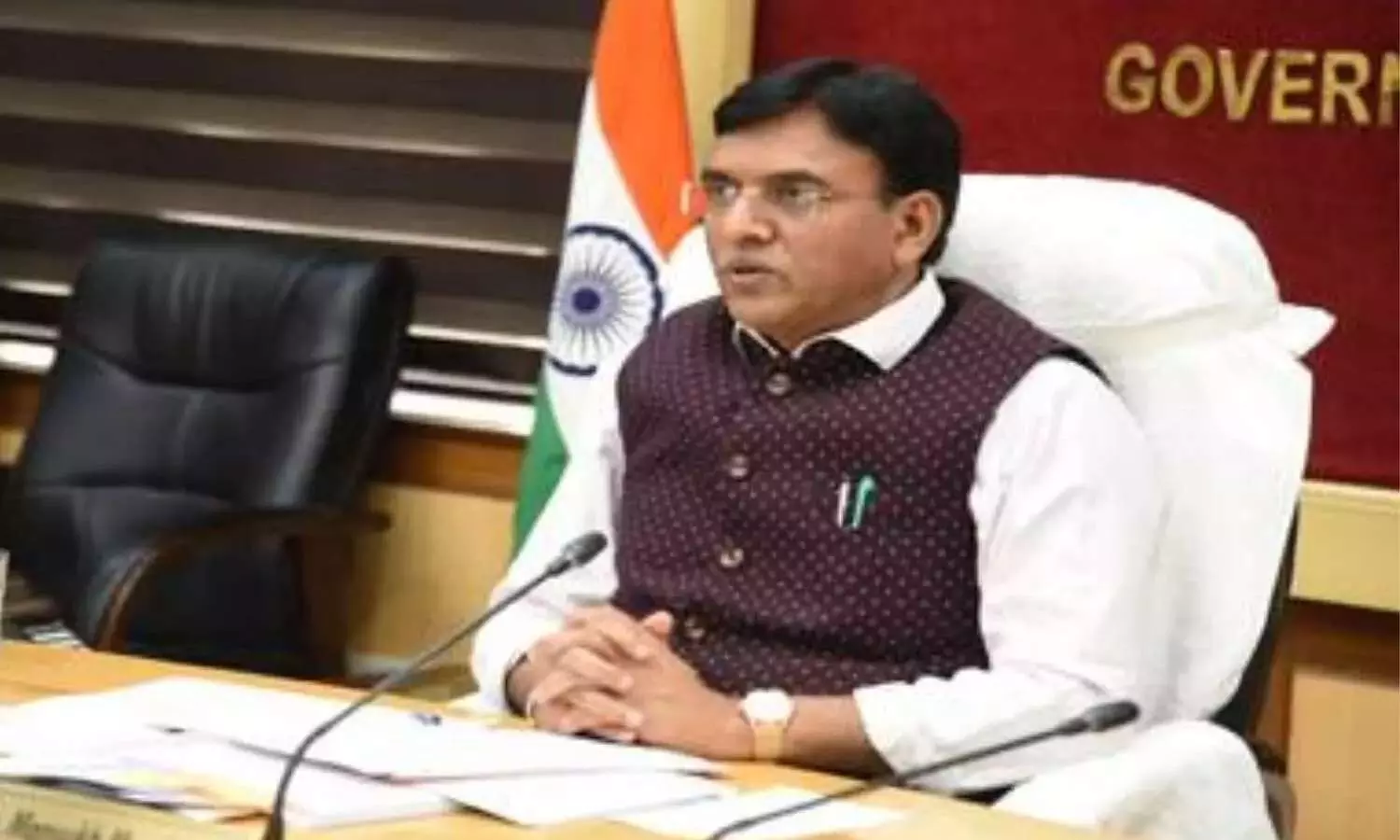- Home
- Medical news & Guidelines
- Anesthesiology
- Cardiology and CTVS
- Critical Care
- Dentistry
- Dermatology
- Diabetes and Endocrinology
- ENT
- Gastroenterology
- Medicine
- Nephrology
- Neurology
- Obstretics-Gynaecology
- Oncology
- Ophthalmology
- Orthopaedics
- Pediatrics-Neonatology
- Psychiatry
- Pulmonology
- Radiology
- Surgery
- Urology
- Laboratory Medicine
- Diet
- Nursing
- Paramedical
- Physiotherapy
- Health news
- AYUSH
- State News
- Andaman and Nicobar Islands
- Andhra Pradesh
- Arunachal Pradesh
- Assam
- Bihar
- Chandigarh
- Chattisgarh
- Dadra and Nagar Haveli
- Daman and Diu
- Delhi
- Goa
- Gujarat
- Haryana
- Himachal Pradesh
- Jammu & Kashmir
- Jharkhand
- Karnataka
- Kerala
- Ladakh
- Lakshadweep
- Madhya Pradesh
- Maharashtra
- Manipur
- Meghalaya
- Mizoram
- Nagaland
- Odisha
- Puducherry
- Punjab
- Rajasthan
- Sikkim
- Tamil Nadu
- Telangana
- Tripura
- Uttar Pradesh
- Uttrakhand
- West Bengal
- Medical Education
- Industry
Mansukh Mandaviya calls for mandatory adoption of Good Manufacturing Practices by all pharma companies

Observations from ongoing risk-based inspections further reiterated the need to have a re-look at the current GMP regulations and quality management systems being followed by pharmaceutical manufacturers, the health ministry said in a statement.
New Delhi: Pharmaceutical companies having an annual turnover of over Rs 250 crore will have to mandatorily adopt Good Manufacturing Practices (GMP) within six months, Union Health Minister Mansukh Mandaviya said on Wednesday. The minister said while those with a turnover of less than Rs 250 crore will have to do so in a 12-month time.Those who fail to follow the timelines may be penalised as...
New Delhi: Pharmaceutical companies having an annual turnover of over Rs 250 crore will have to mandatorily adopt Good Manufacturing Practices (GMP) within six months, Union Health Minister Mansukh Mandaviya said on Wednesday. The minister said while those with a turnover of less than Rs 250 crore will have to do so in a 12-month time.
Those who fail to follow the timelines may be penalised as per the provisions of the law, he added. Mandaviya said that the draft of Schedule M of the Drugs and Cosmetics Act prepared in 2018 has been approved and implemented.
There are around 10,500 manufacturing units in the country out of which around 8,500 units fall under the MSME (Micro, Small and Medium Enterprises) category. India is a major exporter of medicines to LMIC (Low and Middle-Income Countries) which require WHO GMP certification. There are around 2,000 units in the MSME category in the country having WHO GMP certification.
"Pharmaceutical manufacturing and quality domain has developed significantly in last 15-20 years. Our understanding of the domain has increased because of development in Pharmaceutical and Manufacturing Sciences. Linkage between manufacturing and product quality and interdependence between the two has been established," Mandaviya said. Existing schedule M under the Drugs Rules, 1945 prescribes details of requirements of facilities and their maintenance, personnel, manufacture, control and safety testing, storage and transport of material, written procedures, written records, traceability, etc.
The GMP was first incorporated in Schedule M in 1988 and the last amendment was done in 2018. "The Schedule M (of the Drugs and Cosmetics Act) has not been implemented properly by the majority of the drugmakers," he said.
Also, observations from ongoing risk-based inspections further reiterated the need to have a re-look at the current GMP regulations and quality management systems being followed by pharmaceutical manufacturers, the health ministry said in a statement. Recently, drug regulators inspected 162 units and 14 public testing labs and major issues found during inspections are poor documentation, lack of process and analytical validations, absence of quality failure investigation, absence of internal product quality review and faulty design of manufacturing and testing areas, among others.
"Based on these factors and to keep pace with fast-changing manufacturing and quality domain, there was a necessity to revisit and revise the principles and concept of GMP mentioned in current Schedule M. "This would bring our GMP recommendations and compliance expectation at par with global standards, specially to those of WHO, and ensure production of globally acceptable quality of drug," the statement said.
Some of the major changes which will happen with the introduction of revised Schedule M to support the upgradation of the units are the introduction of Pharmaceutical Quality System (PQS), Quality Risk Management (QRM), Product Quality Review (PQR), qualification and validation of equipment, change control management, self-inspection & quality audit team, suppliers audit and approval, stability studies as per recommended climate condition, validation of GMP-related computerised system, specific requirements for manufacturing of hazardous products, biological products, radiopharmaceutical and phytopharmaceuticals. This will address most of the deficiencies related to documentation, failure investigation and technically qualified personnel with the right person doing the right job. It will support the development of a robust quality management system in the company thereby enabling the production of globally acceptable quality medicine, the ministry said.
Ruchika joined Medical Dialogue as an Desk Editor for the Business Section in 2019. She covers all the updates in the Pharmaceutical field, Policy, Insurance, Business Healthcare, Medical News, Health News, Pharma News, Healthcare and Investment. She has completed her B.Com from Delhi University and then pursued postgraduation in M.Com. She can be contacted at editorial@medicaldialogues.in Contact no. 011-43720751



